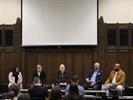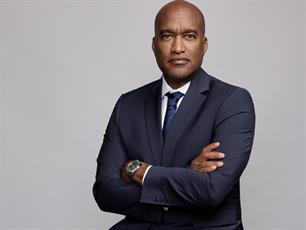Paul Holmes 28 May 2001 // 11:00PM GMT
In 1999, Bayer Corporation’s Biological Products Worldwide Business Unit established its headquarters in Raleigh-Durham/Research Triangle Park, North Carolina (NC). While Bayer has been operating a biologicals manufacturing plant in Clayton, a suburb of Raleigh-Durham, and involved in community activities for the last 25 years, the company has kept a low profile. With the establishment of the worldwide headquarters and the announcement of a major capitol investment in its local facilities, Bayer knew it must develop a strong local corporate identity to build its reputation among key external audiences as a company that cares about important community issues – not just making money. Looking to other Bayer sites’ with strong community ties, local Bayer community relations reps recognized one particularly successful and effective company program – Making Science Make Sense. Bayer’s national grassroots initiative, Making Science Make Sense (MSMS) advances science literacy across the U.S. through hands-on, inquiry-based science learning, employee volunteerism and public education. MSMS particularly appealed to the NC Bayer reps because, locally, the program’s components could be dictated by the community’s science education needs. Also, throughout the state, education reform was top of mind with Governor Jim Hunt’s First in America 2010 initiative, designed to launch NC schools to first in the nation in educational excellence. And in Johnston County, where the Clayton plant is located, school officials were just beginning to explore systemic science education reform.
PROBLEM/OPPORTUNITY
Existing research confirmed a growing national problem – an increasing gap between the number of science and technology-based jobs, and students prepared to fill them (Dept. of Labor); by third grade, half of all students turn off to science, and overall girls and minorities are sorely underrepresented in the sciences (National Assessment of Education Progress [NAEP]); a call for private sector partnerships to spearhead reform (National Science Foundation [NSF]); and, U.S. student performance in math and science consistently not measuring up to students from countries that are our economic peers (Third International Math and Science Study [TIMSS]). Opinion surveys revealed the public favored change in science learning, felt a strong science education is extremely important, believed the nation’s governors need to take steps to implement quality hands-on, inquiry-based science education reform and said parents have the greatest role to play in their children’s learning. Local evaluations of NC students standing in education as compared to students from other states illustrated a need for reform across the board, but particularly in science. According to the most recent NAEP test, only 24 percent of NC’s 8th graders had scored proficient or higher in science.
OBJECTIVES:
- Launch Bayer’s Making Science Make Sense program and its components throughout the local community
- Support NC’s overall education goal (First in America 2010) by supporting science education reform that aligns with national and state standards
- Bolster credibility for MSMS through partnerships with like-minded organizations
- Raise public awareness in NC of the reform efforts and science literacy issues and Bayer’s role in them
STRATEGIES:
- Create a partnership with the local school district aimed at improving science education
- Provide significant monetary and human resources to the district to support science education reform
- Gain acceptance for the MSMS program from other established, well-known statewide education initiatives
- Generate state and local media coverage that articulates the expansion of the program and program messages
AUDIENCES:
State and local government officials, school and community leaders, the media and the public at large
TACTICS:
North Carolina Governor Jim Hunt’s First In America 2010: Launched by Governor Hunt in 1999, First in America is a statewide initiative to make North Carolina’s public schools first in the nation in education by 2010. Recognizing that in order to become first in the nation in education, North Carolina must also become first in science education, Governor Hunt and his aides met with Bayer reps to determine how the company could get involved and help implement systemic science education reform.
NC Department of Public Instruction’s K-8 Science Infrastructure Project: Launched in 1998, the goal of this statewide systemic science education reform project, based on the National Science Foundation’s model for science education excellence, is to bring high quality, inquiry-based science instruction to all children in North Carolina. Currently in 19 school districts, Bayer reps met with project director Brenda Evans to discuss how to get the Johnston County School District (JCSD) on board.
Johnston County School District: Bayer reps met with Assistant Superintendent Keith Beamon and Superintendent James Causby to ascertain the district’s areas of greatest need vis-à-vis science education reform.
Press Conference/School Visit: Bayer invited all of its partners to participate in a press conference/school visit to be held on October 4, 2000 at East Clayton Elementary School, one of 23 schools in JCSD benefiting from the new partnership and education reform announcements.
State/Community Partners: Bayer reps met and negotiated with Governor Hunt’s office, Johnston County Superintendent James Causby and Department of Public Instruction’s Brenda Evans to finalize Bayer’s commitment. All partners were invited to participate and/or attend the press conference.
National Spokesperson: Dr. Mae C. Jemison, scientist, physician, chemical engineer, educator and the first African-American female astronaut, who serves as Bayer’s national science education advocate was tapped for this important local event.
Corporate Spokespeople: Mr. Jan Turek, senior vice president and general manager of Bayer Corporation’s Biological Products Worldwide Business Unit cleared his schedule to attend and make the announcement, thereby providing Bayer’s corporate science message with a “human face.”
Hands-on Science Experiments: Following the press conference, Dr. Jemison and other partners led some 60 fourth grade students through two hands-on science experiments – Sticky Icky and Cool Colors.
Survey: Bayer and its partner, the National Science Foundation, commissioned a Gallup survey of Americans on science and technology, education and America’s future, including questions directed at the nation’s governors and the 2000 presidential candidates.
RESULTS:
On October 4, 2000…
Bayer Corporation Biological Products Worldwide Business Unit announced the launch of MSMS with two key components reaching K-8 students throughout several counties in the Raleigh-Durham area.
The first component, centered in Johnston County, is a $40,000 Bayer grant to support the implementation of the K-8 Science Infrastructure Project in the JCSD, making it one of 20 North Carolina counties helping to bring hands-on, inquiry-based science learning to its students. The grant is earmarked for the purchase of hands-on science curriculum materials, sponsorship of local teams at the Science Leadership Institute run by the North Carolina Department of Public Instruction each summer, and support of ongoing professional development for Johnston County teachers.
The K-8 Science Infrastructure Project aligns with both the North Carolina Standard Course of Study in Science and the National Science Education Standards. It will help contribute toward the success of Governor Hunts First in America 2010 initiative.
With Bayer’s support, the 16,500 students and 1,100 teachers in Johnston County’s 23 elementary and middle schools will learn and teach science the way scientists do – by doing it.
The second MSMS component is a Science Volunteers in the Schools program that Bayer is launching in Wake, Durham, Orange and Johnston Counties, among others. More than 75 Bayer employees will begin working with students and teachers on hands-on science learning at local elementary and middle schools.
Science Volunteers in the Schools is the kind of program endorsed by members of the National Science Teachers Association. In a recent national survey, they said it was “essential” for today’s students to have one-on-one interaction with science volunteers to help prepare them for the challenges of the scientifically and technologically advanced world ahead.
The partners demonstrated their solidarity for the new MSMS program by participating in the press conference. Governor Hunt attended and praised Bayer for its commitment to education and the community. Also attending were JCSD Superintendent James F. Causby and Assistant Superintendent Keith Beamon, Department of Public Instruction’s Brenda Evans, as well as many other local political and community VIPs.
The press conference was covered by the NBC, ABC, CBS, PBS and WB affiliates, WRAL Statewide Radio Network, WPTF-FM, WSHA-FM and WQOK-FM, The Raleigh News and Observer, The Clayton News Star and The Smithfield Herald.
Coverage resulted in 10 television and radio broadcasts, and three print stories, all telling the MSMS story and articulating the program’s science literacy message, and reaching an audience of more than 2.6 million.
Americans, in a recent Gallup survey commissioned by Bayer Corporation and the National Science Foundation, overwhelmingly support just this type of science education reform program and believe that investing in education at the earliest level is one key to strengthening the nation’s future economic success. Some 85 percent said that improving pre-college science education in their state should be one of their governor’s top priorities. And, the best way to strengthen science education is for their state and governor to support pre-college science education reforms that emphasize inquiry-based, hands-on learning over traditional textbook and rote memorization.


































.jpg)

















